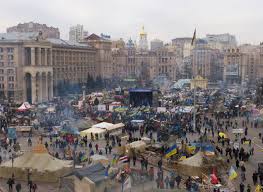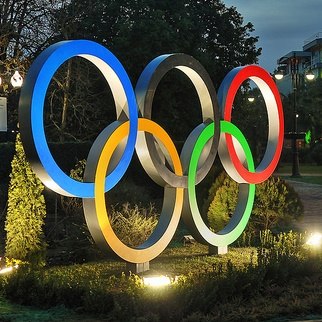(openDemocracy) Most observers thought that any threat to the Sochi Olympics would come from disarray to the east and the south, in the fractious Caucasus. But, as it happened, strife came calling from the West. The difference could not be more stark. As Russia wrapped up its show of stability and splendour in Sochi, Ukraine displayed what is the more common state of affairs in the post-Soviet space: an embittered and bitterly divided populace, a dysfunctional political elite, a nation with an unusable past and a seemingly unattainable future.
After socialism
The violence and chaos on the streets of Kyiv and other Ukrainian cities stood, first and foremost, as evidence of leaders' inability – in some cases, even unwillingness – to live up to the aspirations of their people. The difficulties of post-socialist transition seem to have endowed ruled and rulers alike with a dangerous mix of entitlement and impunity. But citizens have learned more quickly than politicians the value of governance. Whether in the language of ethnic chauvinism or democratic liberalism, citizens demand the same thing: leaders that can be held accountable, heads that can be made to roll.
Citizens have learned more quickly than politicians the value of governance….leaders that can be held accountable, heads that can be made to roll
Ukraine is only the latest example, and the biggest, but most former Soviet states have seen some degree of the same. Others (Uzbekistan, Turkmenistan) certainly will. Only Russia seems unfazed. Moscow's liberal twitterati fret at the fizzling of their own protest movement, which spooked the Kremlin but generated nothing of the heat we've seen in Kyiv.
Not that Russia's rulers are any better than their Ukrainian counterparts. Russians are aware of the corruption that permeates their state, of the lengths to which their leaders have gone to shield themselves from the influence of the democratic institutions that brought them to power. The show at Sochi went on not because Russians were unaware of their plight, but because they had, it would seem, accepted it. And Victor Yanukovych probably watched the closing ceremony in Sochi on Russian television because Ukrainians, evidently, have not accepted theirs.
Similarities and differences
The political watershed in Ukraine is complex, dividing east and west, Catholic and Orthodox, Russian and Ukrainian speakers, liberal and conservative and chauvinist, those who see strength in integration and those who see weakness. The political watershed in Russia, by contrast, is simple: it runs between those who believe that a better future for the country is possible, and those who do not. Three rouble devaluations in the ‘90s, countless stolen elections and skyrocketing inequality have turned Russians into rugged individualists. When the state appropriated millions of Russians’ pension savings last year, there was hardly a whimper of dismay.
Citizens who believe in the future of their state are willing to contest it, in the voting booths or at the barricades. They are driven by political passions precisely because those passions matter to them in a very real sense. There are, to be sure, those in Russia who are similarly politically passionate, and some of them support Putin. In the early years of Russian democracy, the dedication to politics ran high. But that passion was never requited by Russia’s political establishment, and it has dissipated. In the more than two decades since the fall of the communism, Russians have learned to prosper not with their state, but despite it. Russians of all social strata—those who retire to town homes in Mayfair and those who can retreat only to their dachas and kitchen tables—live in a kind of Soviet-style divorce from their state, forced for lack of an alternative to continue to share the same space but living independent, mutually spiteful lives.
Russians have learned to prosper not with their state, but despite it…continuing to share the same space but living independent, mutually spiteful lives
Ukrainians, of course, have also learned to defend themselves from the difficulties of the prolonged post-Soviet transition, which in many ways has been worse in Ukraine than in Russia. But the same politics of identity and existential crisis that have made policymaking in Kyiv impossible have, ironically, made politics more relevant to Ukrainians than to Russians. Any Russian politician who decides to base his legitimacy on public support rather than the price of oil will first have to convince his would-be electorate that the state is meaningful. Some, including Aleksey Navalny, have turned to identity politics and nationalism to attempt this but there is little traction there: Russia is diverse on paper but homogeneous in practice.
There is a lesson here for Ukraine, too, particularly for those leaders who feel that the ‘Euromaidan’ has put the wind at their back. Speaking at the Munich Security Conference in late January, opposition leader Arseny Yatseniuk implored Western leaders to provide his people with a new Marshall Plan. Aside from the fact that the West has neither the vision nor the treasure for such a plan, the real danger is in the message sent home to Ukrainians, that salvation comes from Brussels and Washington, not from Kyiv.
Ukrainian leaders have the chance to prove that the state can be worthy of the passions of its citizens. If they fail, Ukraine may end up looking a lot more like Russia.
See the original article | openDemocracy










